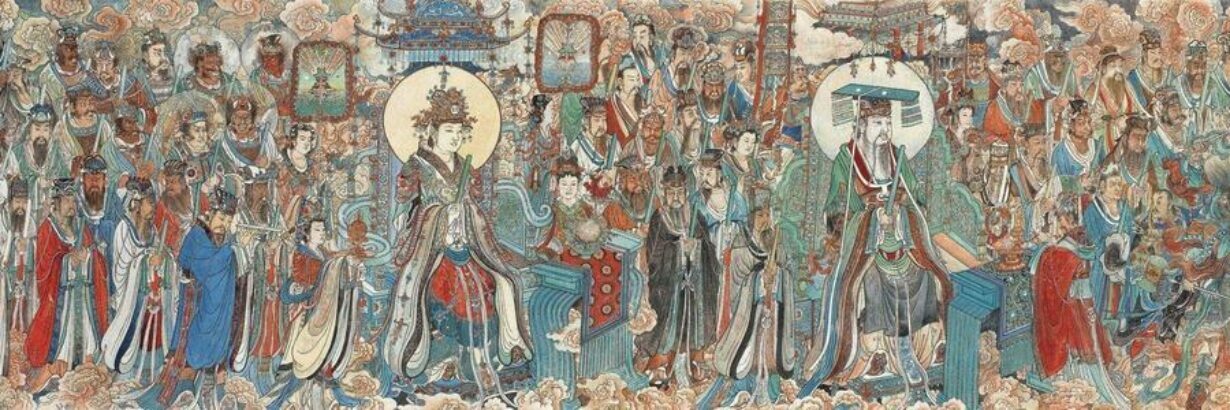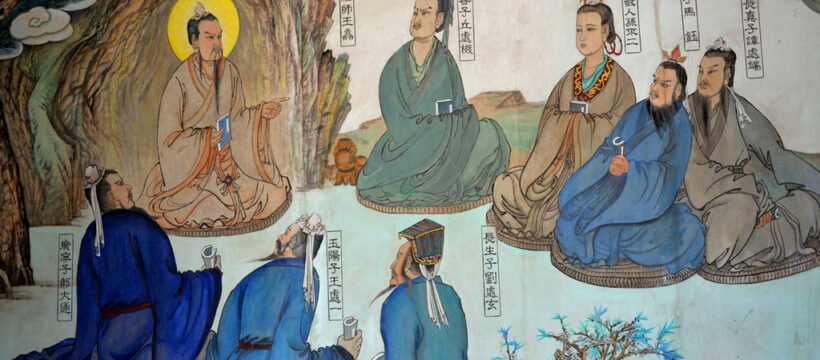The Quanzhen tradition is a prominent school of Daoism that has greatly influenced the development and practice of Daoist ceremonies. Rooted in the teachings of Wang Chongyang and his disciples during the Jin Dynasty (1115-1234 CE), the Quanzhen tradition emphasizes inner alchemy, moral cultivation, and the integration of spiritual practices into daily life.
The Quanzhen tradition traces its origins to the late 12th century when Wang Chongyang, a scholar and retired official, founded the school in the Zhongnan Mountains of China. Wang’s teachings were inspired by a fusion of Daoist, Buddhist, and Confucian principles, seeking to synthesize the best aspects of these traditions into a comprehensive path of spiritual cultivation.
Core Principles of Quanzhen: The Quanzhen tradition emphasizes three fundamental principles:
- Wu Wei (Non-Action): Quanzhen practitioners strive to align themselves with the natural flow of the Dao, embracing the principle of non-action or effortless action. This principle encourages individuals to let go of ego-driven desires and allow the Dao to guide their actions and decisions.
- Zhen Ren (Authentic Virtue): Cultivating authenticity and virtue is central to the Quanzhen tradition. Practitioners are encouraged to cultivate compassion, humility, integrity, and moral values in their interactions with others and the world.
- Xiulian (Self-Cultivation): Quanzhen practitioners focus on inner alchemy and self-transformation through meditation, breathwork, visualization, and other practices. The aim is to refine one’s inner energies, harmonize body and mind, and attain spiritual enlightenment.
Quanzhen Ceremonial Practices: Quanzhen ceremonies are designed to facilitate spiritual growth, promote well-being, and foster a deep connection with the Dao. Some notable ceremonial practices within the Quanzhen tradition include:
- Initiation Ceremony: Known as “entering the gate” (ru men), this ritual marks the formal entry of individuals into the Quanzhen lineage. It involves vows, purification rituals, and receiving teachings from a qualified master.
- Daily Rituals: Quanzhen practitioners engage in daily rituals to maintain spiritual discipline and align with the Dao. These rituals typically include meditation, recitation of scriptures, and offerings to deities or ancestral spirits.
- Transmission Ceremony: This ceremony signifies the passing down of the Quanzhen lineage from one generation to the next. It involves a formal transmission of teachings, blessings, and responsibilities from a master to a disciple.
- Pilgrimages and Retreats: Quanzhen practitioners often undertake pilgrimages to sacred sites and participate in retreats to deepen their spiritual practice. These activities provide opportunities for contemplation, self-reflection, and communion with nature.
Enduring Significance: The Quanzhen tradition continues to be influential in contemporary Daoist practice, both in China and around the world. Its emphasis on ethical living, self-cultivation, and integration of spiritual principles into daily life resonates with individuals seeking a balanced and meaningful existence.
Moreover, the Quanzhen tradition has made significant contributions to the broader understanding and preservation of Daoist philosophy, rituals, and ceremonial practices. Its teachings and ceremonies serve as a valuable source of guidance, inspiration, and wisdom for those on the path of spiritual growth and self-realization.
Conclusion: The Quanzhen tradition of Daoism stands as a testament to the enduring power and relevance of Daoist ceremonies. Rooted in a fusion of Daoist, Buddhist, and Confucian principles, the Quanzhen tradition offers a comprehensive path of spiritual cultivation that emphasizes inner alchemy, authentic virtue, and harmonious living. Its ceremonies, rituals, and principles continue to inspire and guide individuals in their quest for spiritual enlightenment and connection with the Dao.
Written and Translated by Daoist Liu Cheng Yong, German Daoist Association.


Thank you 🙏🏻